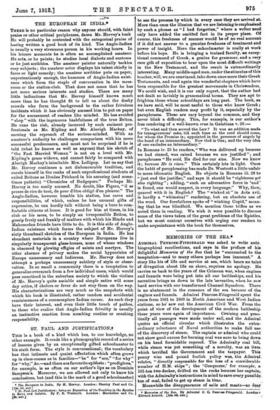ST. PAUL AND JUSTIFICATION.f
THIS is a book of a kind which has, to our knowledge, no other example. It reads like a phonographic record of a series of lessons given by an exceptionally gifted schoolmaster to his sixth form. The style is conversational; the vocabulary has that intimate and quaint affectation which often grows up in class-rooms as in families—" be " for "are," "for why" for "why," &c.—and there are favourite epithets : "prodigious," for example, is as often on our author's lips as on Dominie Sampson's. Moreover, we are allowed not only to know his conclusions, but (and this is the mark of a good schoolmaster) • The European in India. By H. Hervey. London: Stanley Pad and Co. [128. 6d. net.] t St. Paul and Justification: being an Exposition of the Teaching in the Epistles to Rome and Galatia. By F. B. Westcott. London : Macmillan and Co.
net.1
to see the proem by which in every case they are arrived at More than once the illusion that we are listening is emphasised by such a phrase as "I had forgotten," where a writer need only have added the omitted fact in its proper place. Of course, this freshness of manner would be of no real account if it did not answer to a genuine freshness of treatment and
power of insight. Here the schoolmaster is really at work before his boys. He is bringing a trained faculty, en excep- tional command of Greek, a genius for grammar, and a very rare gift of exposition to bear upon the most difficult writings in the New Testament, and the result is extraordinarily interesting. Many middle-aged men, under the stimulus of this teacher, will, we are convinced, take down once more their Greek Testaments, and read again the wonderful chapters which have been responsible for the greatest movements in Chrisbendom. We could wish, and it is our only regret, that the author had not dealt so lavishly in grammatical terms. They are apt to frighten those whose schooldays are long past. The book, as we have said, will be most useful to those who know Greek ; but even English readers may profit by it, especially by the paraphrases. These are racy beyond the common, and they never blink a difficulty. This, for example, is our author's
free rendering of a well-known crag in Galatians v. 20 :— " To what end then served the Law ? It was an addition made for transgressions' sake, till such time as the seed should come, for whom the Promise is ; appointed in the presence of angels by the hand of an intermediary. Now God is One; and the very idea of one excludes an intermediary."
In Romans iv. 25 be renders," Who was delivered up because we had sinned, was raised because we are justified"; and paraphrases " He said, He died for our sins. Now we know it ; because He is risen." This certainly lets in light. Once the habit of paraphrasing has made Dr. Westcott a little unfair to more idiomatic English. He objects in Romans iii. 26 to "just and the justifier," and says it should be "righteous yet also righting "; adding, " such an adversative force in 'and'
is found, one would suspect, in every language." Why, then, quarrel with it in English ? The "winked at" in Acts xvii. is hardly a "whimsical" rendering, but an obsolete use of the word. Our forefathers spoke of " winking Cupid," mean- ing that he was blindfold. We mention these trifles as we noted them in reading. We wish it were possible to discuss some of the views taken of the great problems of the Epistles, but we must content ourselves with urging our readers to make acquaintance with the book for themselves.














































 Previous page
Previous page